Newsletter
Weibo Watch: A New Chapter
About balloons, drone dragons, changes coming to What’s on Weibo, and much more.
Published
6 months agoon

PREMIUM NEWSLETTER | ISSUE #42
This week’s newsletter:
◼︎ 1. Editor’s Note – A New Chapter
◼︎ 2. What’s New – A closer look at featured stories
◼︎ 3. What’s Trending – Hot highlights
◼︎ 4. What’s Noteworthy – A strange record
◼︎ 6. What’s Popular – Jackson Yee’s stellar performance
◼︎ 7. What’s Memorable – Looking back at the 10 most-read stories of 2024
Dear Reader,
From Hangzhou to Wuhan, the New Year in China was celebrated with the release of thousands of balloons at midnight in cities across the country. In Hangzhou alone, approximately 70,000 people attended the New Year countdown celebrations, with some bloggers estimating that street vendors sold at least 20,000 balloons in one night. In Nanchang, the capital of Jiangxi province, thousands of people also released balloons in the city center, resulting in stunning crowd videos (see here).
While a sky filled with balloons makes for some spectacular images and footage, adding to the festive sphere, there are also worries about this contemporary ‘tradition.’

The Nanchang balloon moment at midnight.
The sight of tens of thousands of people gathering in city centers, such as in Nanchang, has triggered discussions about the dangers of unexpected incidents leading to panic, potentially causing stampedes like the tragic event in Shanghai a decade ago.
Beyond crowd safety, the release of thousands of balloons introduces another serious risk. Hydrogen-filled balloons (hydrogen is often illegally used in balloons because it’s cheaper than helium) are highly flammable, and contact with high-voltage lines or open flames can lead to explosions and hazardous situations. One such incident occurred in Xinyang on New Year’s Eve, when balloons exploded at the crowded entrance of a shopping mall (video). In Hangzhou, a 22-year-man was arrested at the scene for setting off fireworks in Hangzhou during the balloon release festivities, also causing local explosions.
And then, there are concerns about the environmental impact. The balloon release festivities in Hangzhou alone resulted in an estimated six tons of garbage being left behind, making the cleanup a massive and costly undertaking. While sanitation workers are mobilized to tackle the mess, many balloons end up caught in trees, tangled in bushes, or drifting so far that they’re beyond the reach of cleanup crews. The sheer amount of plastic waste left behind has sparked online discussions, with many questioning the environmental consequences of these celebrations.
So what’s the alternative?
This year, you might have seen a viral video of an impressive drone show supposedly held on the Bund in Shanghai, featuring a dragon formed by dozens of drones dancing in the night sky, crowned by a circle of fireworks. The video went viral across Instagram, TikTok, Facebook, and X. Even Elon Musk liked the video, tweeting his “wow” comment: look how China celebrates the New Year!
The video, however, turned out to be fake. In fact, there was no show for New Year’s at the Bund at all.
The video creator combined elements from various other videos, including a drone light show featuring a majestic dragon that took place in Shenzhen on October 1st, marking the 75th anniversary of the People’s Republic of China (video).
The glowing circle in the sky was from a firework and AI show held in Liuyang, Hunan, on December 7, titled “Tears of the Gate of Heaven” (天空之门的眼泪). The falling lights symbolized tears from heaven and were designed by a local firework company boss to commemorate his late mother (video).
Upon further research, I found that the Liuyang show had inspired a series of edited videos, placing the Liuyang show highlight in different locations, with each version more spectacular than the last (see examples). As reported by Annielab, there are even online tutorials teaching netizens how to digitally insert the Liuyang ‘gate’ into different backgrounds with the Jianying (剪映, aka Capcut) editing app.
What began as an online meme (“I haven’t been to the Liuyang show, but I can bring it to my town”) eventually resulted in the viral video combining the Shenzhen and Liuyang shows against the backdrop of the Bund. For the quick scrollers, it apparently was so realistic that even Elon Musk thought it was genuine.
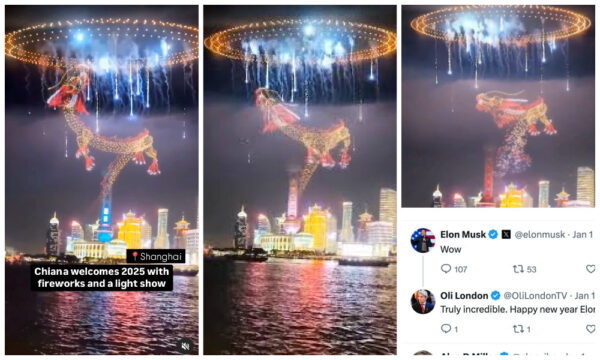
Stills from the fake drone dragon video.
The fake drone dragon New Year video is interesting for several reasons. It highlights how quickly fake news about China spreads across social media, with few questioning the authenticity of viral posts—even when they’re shared with millions of followers. We’ve seen this pattern before, with stories about the social credit system, a supposed Xi Jinping chatbot, and heavily edited cyberpunk-style Chongqing scenes.
These trends often repeat themselves, portraying China in extremes: either as a futuristic utopia or a dystopian threat. They go viral because they serve as clickbait, used by both hostile “anti-China” accounts and propaganda-heavy “pro-China” accounts to push their narratives—look how great China is or look how scary China is.
The dragon video, though fake, also underscores China’s role as a global tech power. Its components—real drone and AI shows in Liuyang, Shenzhen, and other cities—demonstrate just how advanced the technology has become, to the point where reality and fabrication are increasingly difficult to distinguish.
It’s just a video, but it points to something bigger: the lack of understanding about what is actually happening in China. Whether it’s about China’s digital space or society at large, most people don’t take the time—or simply don’t have the time—to look beyond the surface of fast-moving stories. This tendency risks amplifying misconceptions. Before you know it, you might retweet a fake dragon video, interpreting it as evidence of a powerful or intimidating China, without realizing it’s part of a broader grassroots trend that’s misunderstood—or missing the fact that, for now, far more balloons than drones still rise into the skies during New Year’s celebrations.
Before I wander off with the balloons, what’s the takeaway? As we step into 2025, with AI playing an ever-growing role on social media and global influencers shaping the news we consume—often with their own agendas—it’s more important than ever to examine the stories we amplify critically. Only by paying attention to the details can we truly understand the bigger picture.
Announcing some changes to What’s on Weibo
This brings me to an exciting new chapter for What’s on Weibo and how I see the future of the site. The China-focused global news environment has evolved significantly since I first started this platform. There’s now an increased focus in mainstream media on China’s social media trends, and niche China-related news has become accessible to many thanks to innovative tools at our fingertips. While there’s more information than ever, it’s also becoming increasingly chaotic and fleeting.
As a smaller, independent voice in this fast-paced and crowded media arena, I’m committed to offering you unique and meaningful insights into Chinese society and digital culture that you won’t find anywhere else. In this video, I’ll explain the changes coming to the site, introducing What’s on Weibo Chapters. In these turbulent, dragon-drone times, I hope you’ll appreciate this new chapter for What’s on Weibo.
Our first Chapter, of course, is “15 Years of Weibo,” reflecting on the platform’s evolution since its launch in 2009 and its role in China’s competitive social media ecosystem today. We’ll explore the most popular influencers on Weibo, go deeper into Weibo diplomacy aka ‘Weiplomacy’, and will feature a special contribution by an expert guest writer. More on that coming soon!
A shout-out to Miranda Barnes and Ruixin Zhang for helping select some of the topics for this newsletter, and a very special thanks to Wytse Koetse for filming and editing the What’s on Weibo Chapters video.
Stay tuned!
Warm greetings,
Manya Koetse
(@manyapan)
What’s New

Our picks | From ‘Chillax’ to ‘Digital Ibuprofen,’ this compilation of ten Chinese buzzwords and catchphrases by What’s on Weibo reflects social trends and the changing times in China in 2024.
What’s Trending
🏚️ Earthquake in Tibet
The devastating 7.1 magnitude earthquake that struck Shigatse’s Tingri County high on the Tibetan plateau on the morning of January 7th has already claimed the lives of at least 95 people and left over 130 injured. Approximately 6,900 people reside in the villages surrounding the earthquake’s epicenter. On Weibo, videos reveal the catastrophic impact of the earthquake, with entire neighborhoods reduced to rubble.
Shigatse City’s Deputy Mayor Liu Huazhong (刘华忠) appeared visibly emotional as he announced the latest death toll and shared that 14 townships have been severely affected by the disaster. At the time of writing, the government has activated the highest-level emergency response for disaster relief, with hundreds of rescue workers deployed to the affected areas to provide medical assistance, conduct search and rescue operations, and distribute emergency supplies.
🤒 Peak Flu Season
It’s peak flu season, and it’s evident in the various trending topics circulating on Chinese social media. As discussions grow about crowded hospitals, face masks, and flu medication, concerns about the rapidly rising rates of influenza viruses have also emerged. Currently, according to monitoring data from the Chinese Center for Disease Control and Prevention, over 99% of flu cases in China are identified as the Influenza A virus subtype H1N1 (“甲流”).
There have also been reports of an increase in flu-like human metapneumovirus (HMPV, 人偏肺病毒) infections in northern China, particularly among children under the age of 14. On social media, Chinese experts are largely addressing these concerns by emphasizing that HMPV is not the same as Covid-19, is less common compared to influenza and mycoplasma infections, and that the recent rise in HMPV cases is not unusual but rather reflects the typical higher prevalence of respiratory viruses during winter.
🏓 Chinese Table Tennis Superstars Withdraw from World Rankings
There has been a lot of buzz about the world of table tennis recently. After a tumultuous 2024 in which Chinese table tennis players shone at the Paris Olympics, super popular table tennis stars Fan Zhendong (樊振东) and Chen Meng (陈梦) announced on Weibo (post 1, post 2) their withdrawal from the World Rankings (WR) due to new fines imposed by the International Table Tennis Federation (ITTF) for players not participating in tournaments.
Fan wrote that the Paris Olympics had left him “mentally exhausted” and that the new rules imposing fines for not participating in tournaments left him no other choice but to withdraw entirely. He also said he would not retire yet and quoted the Wicked line, “It’s time to try defying gravity 💚.” That post received more than 2.8 million (!) likes. Likewise, Chen also wrote about the impact of Olympic stress and that she still needs time to recover.
The withdrawal of these major table tennis icons—veteran athlete Ma Long (马龙) later also announced his withdrawal—has ignited discussions and criticism over WTT’s mandatory participation rule and whether it merely serves commercial interests instead of protecting athletes. Liu Guoliang (刘国梁), president of the Chinese Table Tennis Association (CTTA), said he would press World Table Tennis to revise its rules.
🏛️ Verdict in Handan Schoolboy Murder Case
A case in which a young boy from Feixiang County in Handan, Hebei, was murdered by three classmates shocked the nation in March 2024. The young boy, Wang Ziyao (王子耀), had suffered years of bullying before his three classmates, all 13 years old, killed and buried him. Wang had been missing for one day before his body was discovered buried in a greenhouse in a field near the home of one of the suspects. The case attracted major attention at the time, not just because of the cruel crime, but also due to its legal implications. Since an amendment to China’s Criminal Law in 2021, children between the ages of 12 and 14 can be held criminally responsible for extreme and cruel cases resulting in death or severe disability, if approved for prosecution by the Supreme People’s Procuratorate (SPP).
Now, the court verdict has been reported by Chinese media. Two of the male defendants were sentenced to life imprisonment, while the third defendant was not legally punished due to his minor role in the crime but was still placed under “special correctional education.” The verdict has triggered discussions on its implications and how it should now be clear to minors aged 12 and above, and their parents, that they cannot escape severe punishment for extreme crimes.
🎬 Li Mingde’s Livestream Permanently Banned
The young Chinese actor Li Mingde (李明德), also known as Marcus Li, has been the center of attention on Chinese social media recently due to the drama surrounding the production of the Chinese TV series The Triple Echo of Time (三人行). In a Weibo post published on the night of January 4, Li, a supporting actor in the series, accused co-star Ma Tianyu (马天宇), the male lead, of displaying diva behavior on set. He also complained about the harsh filming conditions, alleging that he was made to wait in freezing temperatures wearing nothing but a t-shirt.
The production team has since issued a statement denying Li’s claims and turned the tables, accusing Li of being unreasonable, negative, and frequently late or leaving early during filming. They also confirmed that they had officially terminated their collaboration with him.
Adding to the controversy, Li Mingde’s livestream channel was suddenly shut down on January 7, with Douyin permanently banning his account. The platform cited “deliberately stirring controversy to attract attention” as the reason for the ban, sparking widespread discussion online. Li, who has over 7.6 million followers on Weibo, continues to post updates at the time of writing. After Ma Tianyu suggested in a now-deleted post that Li might be suffering from a mental illness, Li refuted the claim and stated he plans to take legal action. It seems this drama is far from over.
What’s Noteworthy

Did you know that the final Guinness World Record of 2024 was set by Chinese e-commerce giant JD.com? Honestly, the record is so unusual that I initially struggled to understand what the achievement was: JD.com now holds the Guinness World Record for the world’s “largest object unveiled” in Liangshan Yi Autonomous Prefecture, Sichuan, on December 29, 2024—a staggering 400.66 meters long.
Is it a rocket? A train? A cruise ship?
No, it’s actually a list of 173,583 authentic user comments—a 400-meter-long comment section reviewing the platform’s major home appliance products. JD.com, one of the leading players in China’s home goods and household appliances market, seems to have orchestrated this extravagant marketing stunt to emphasize its position as a trustworthy market leader with an alleged 98% satisfaction rate.

The 400+ meter list, via Digitaling.
As an online retailer, printing reviews and displaying them in an offline setting where virtually no one but Guinness World Records takes notice does seem wasteful. But here we are, talking about it—along with a trending hashtag (#24年最后一个吉尼斯纪录是京东的#), so I suppose the PR effort paid off.
What’s Popular

After the 2024 success of Her Story(好东西) directed by Shao Yihui (邵艺辉) YOLO (麻辣滚烫) by Jia Ling (贾玲), Like A Rolling Stone (出走的决心) by Yin Lichuan (尹丽川), we are now seeing another hit film by a female director, highlighting the growing prominence of female directors in Chinese cinema.
The hashtag for the new movie Little Me (小小的我) has received over a billion views on Weibo this week (#电影小小的我#), noting its popularity. The movie was directed by Yang Lina (杨荔钠), the female director also known for her film Song of Spring (妈妈), which tells the moving story of an 85-year-old mother caring for her 65-year-old daughter with Alzheimer’s disease.
Little Me again touches on profound themes as it tells the story of a young man suffering from cerebral palsy who nevertheless tries to find his own direction in life. The role is played by Jackson Yee (易烊千玺), the superstar with an enormous fanbase on social media. Although he is still known as the youngest member of the boyband TFboys, Yee has gone far beyond that and shows his talent and dedication as an actor in this film with a credible performance.
Although Jackson Yee’s standout performance in Little Me is praised across social media, some have also commented that the actor might be too good for the film. Qilu Evening News published a sharp movie review, noting that Yee’s performance creates a stark divide between his brilliance and the film’s otherwise mediocre quality. This disparity has led some viewers to comment that Little Me is “a dumpling made just for the vinegar” (“为了一碟醋包了一顿饺子”). Despite this criticism, the film is still scoring a 7.2 on the Douban platform, where it has been rated by over 164,000 people.
What’s Memorable

As we’re entering the second week of 2025, I’d still like to take this time to look back look back at 10 of the most popular stories on
What’s On Weibo of 2024 for this week’s archive lookback. From viral trends to shocking incidents, it was a tumultuous year with some moments that’ll be ingrained in China’s collective digital memory. 🧵👇
1️⃣🐱 When ‘Fat Cat’ Jumped into the Yangtze River | He invested all he had for a girl he’d met online. Then she broke up with him. The tragic story behind the suicide of a 21-year-old Chinese gamer nicknamed ‘Fat Cat’ (胖猫) became a major topic of discussion on Chinese social media in May of 2024, touching upon broader societal issues from unfair gender dynamics to businesses taking advantage of grieving internet users.
🔗
https://www.whatsonweibo.com/the-tragic-story-of-fat-cat-how-a-chinese-gamers-suicide-went-viral/
2️⃣✨ Chengdu Disney | How did a common park in Chengdu turn into a hotspot that got everyone talking? By mixing online trends with real-life fun, blending foreign styles with local charm, and adding humor and absurdity, Chengdu had the recipe for its very own ‘Chengdu Disney’ in 2024. Undeniably, the quirkiest trend of the year.
🔗
https://www.whatsonweibo.com/chengdu-disney-the-quirkiest-hotspot-in-china/
3️⃣💧 Nongfu and Nationalists | One of the most noteworthy online phenomena in China during 2024 was the big battle over bottled water after the death of Zong Qinghou (宗庆后), the founder and chairman of Wahaha Group (娃哈哈集团), the country’s largest beverage produce. What started as a support campaign for Wahaha morphed into a crusade against another major water brand, Nongfu Spring, led by online nationalists.
🔗
https://www.whatsonweibo.com/in-hot-water-the-nongfu-spring-controversy-explained/
4️⃣🔪 Beishan Park Stabbings | 2024 was, unfortunately, a year of many deadly mass attacks by individuals ‘taking revenge on society,’ from Zhuhai to Changde. One such incident that made headlines around the world was the June 10 stabbing at Beishan Park in Jilin, which left four American teachers injured, among others. While the story spread widely on X, it was initially kept under wraps on the Chinese internet. This article analyzes how the incident was reported, censored, and discussed on Weibo.
🔗
https://www.whatsonweibo.com/the-beishan-park-stabbings-how-the-story-unfolded-and-was-censored-on-weibo/
5️⃣🥇 Golden Olympics | The 2024 Paris Olympics were the talk of Chinese social media. Beyond the gold medal moments, there were plenty of happenings on the sidelines, at the venues, and on the award stage that went viral, sparking countless memes. From China’s cutest weightlifter to viral sensation Quan Hongchan, this top 10 list of meme-worthy moments was a favorite among readers.
🔗
Team China’s 10 Most Meme-Worthy Moments at the 2024 Paris Olympics
6️⃣🚗 Land Rover Woman | In 2024, ‘Land Rover Woman’ (路虎女) became the latest addition to the Chinese Lexicon of Viral Incidents. A female Land Rover driver sparked outrage among Chinese netizens with her entitled behavior, driving against traffic and reacting aggressively when confronted—even striking a Chinese veteran in the face. The incident highlighted widespread frustration with social class injustice, as many viewed it as reflecting existing power imbalances between the wealthy and the working-class.
🔗
https://www.whatsonweibo.com/weibo-watch-the-land-rover-woman-controversy-explained/
7️⃣🧮 Controversial Math Genius Jiang Ping | It’s rare for a math competition to become the focus of nationwide attention in China. But when 17-year-old vocational school student Jiang Ping made it to the top 12 of Alibaba’s Global Math Competition, competing against contestants from prestigious universities worldwide, her humble background and outstanding achievement sparked debates and triggered rumors. She was called China’s version of Good Will Hunting, but her math story had a disappointing ending.
🔗
https://www.whatsonweibo.com/chinas-controversial-math-genius-jiang-ping/
8️⃣🇺🇸 Trump’s Triumph |The assassination attempt on former US President (now President-elect) Trump at a Pennsylvania campaign event in July 2024 became a major topic on Chinese social media. Trump’s swift reaction and defiant gesture after the shooting not only sparked widespread discussions but also fueled the “Comrade Trump” meme machine.
🔗
https://www.whatsonweibo.com/a-triumph-for-comrade-trump-chinese-social-media-reactions-to-trump-rally-shooting/
9️⃣📚 Crusade against Smut | A recent crackdown on Chinese authors writing erotic web novels sparked increased online discussions about the Haitang Literature ‘Flower Market’ subculture, the challenges faced by prominent online smut writers, and the evolving regulations surrounding digital erotica in China. But how serious is the “crime” of writing explicit fiction in China today? Ruixin Zhang explored this topic in an insightful and widely-read article, with a sad update.
🔗
https://www.whatsonweibo.com/the-price-of-writing-smut-inside-chinas-crackdown-on-erotic-fiction/
🔟🚴♂️ Cycling to Kaifeng | The term ‘yè qí‘ (夜骑), meaning “night ride,” suddenly became a buzzword on Chinese social media in late fall of 2024, as large groups of students from various schools and universities in Zhengzhou started cycling en masse to the neighboring city of Kaifeng on shared bicycles in the middle of the night. From city marketing to the spirit of China’s new generation, there are many themes behind their nightly cycling caravan, explained in this article, which also became one of the best-read pieces on What’s on Weibo this year:
🔗
https://www.whatsonweibo.com/the-cycling-to-kaifeng-trend-how-it-started-how-its-going/
This is an on-site version of the Weibo Watch newsletter by What’s on Weibo. Missed last week’s newsletter? Find it here. If you are already subscribed to What’s on Weibo but are not yet receiving this newsletter in your inbox, please contact us directly to let us know.
Manya is the founder and editor-in-chief of What's on Weibo, offering independent analysis of social trends, online media, and digital culture in China for over a decade. Subscribe to gain access to content, including the Weibo Watch newsletter, which provides deeper insights into the China trends that matter. More about Manya at manyakoetse.com or follow on X.

You may like
China Media
IShowSpeed in China: Streaming China’s Stories Well
Published
4 months agoon
March 30, 2025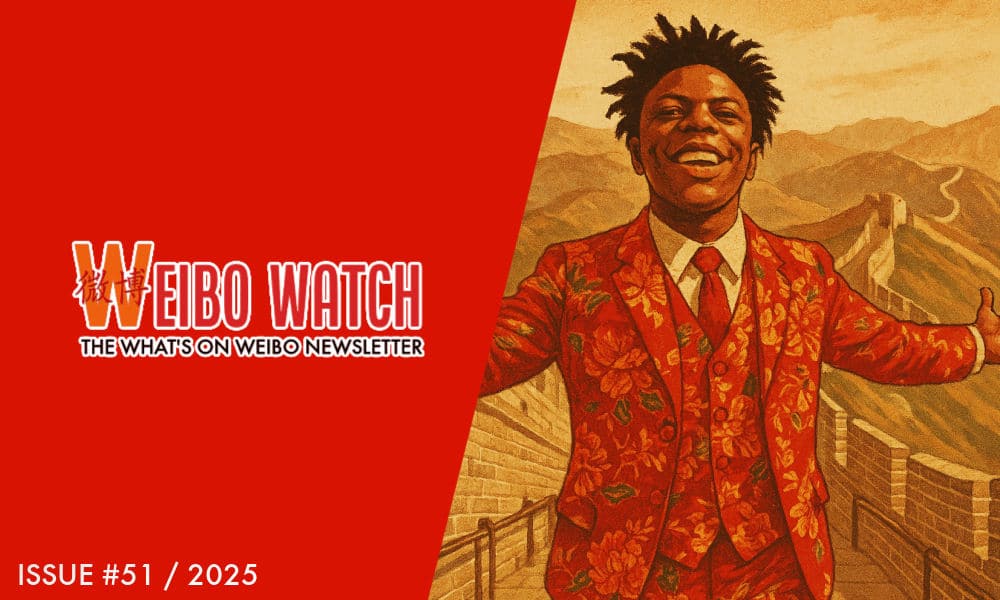
“This man is doing God’s work. In just six hours, he eliminated all Western media propaganda about China,” Chinese influencer Li Sanjin (李三金) said in one of his videos this week. The man he referred to, allegedly doing ‘God’s work,’ is the American YouTuber and online streamer Darren Watkins, better known as IShowSpeed or Speed, who visited China this week and livestreamed from various locations.
With 37 million followers on his YouTube account, Watkins’ visit hasn’t exactly flown under the radar. His streams from China have already accumulated over 17.5 million views on YouTube alone, and he also became the talk of the week on Chinese social media.
In China, the 20-year-old IShowSpeed is known as Jiǎkànggē (甲亢哥), or “Hyper Bro,” since the immensely popular YouTube star is known for being highly energetic.
Although IShowSpeed is originally known for soccer and gaming-related content, he’s been streaming live from various countries over the past year, from Ecuador to Bolivia, from Australia to Indonesia, from Romania to Japan, and also from the Netherlands, where a mob of fans harassed the YouTuber to such an extent that the influencer fled and panicked, until the police intervened and asked him to shut down the livestream for safety reasons — which he did not comply with.
It was not the only time IShowSpeed’s visit got chaotic. He also got into trouble during livestreams from other countries. While streaming from Norway, he injured his ankle and was swarmed by a crowd while trying to get out. In Greece and Indonesia, he had to ask for police support as well. In Thailand, he crashed a tuk-tuk into a temple wall.
In China, IShowSpeed’s livestreams went far more smoothly, and netizens, state media, and other official channels raved about his visit and its favorable portrayal of the country and its culture.
🔹 Symbol of Cultural Exchange & Positive Diplomacy
“Jiǎkànggē” became one of the viral terms of the week, on Weibo, Kuaishou, Douyin, and Toutiao. During his China trip, the livestreamer hit several YouTube milestones — not only breaking the 37 million subscriber mark while on stream, but also surpassing the magic number of 10 million views in total.
Watkins, also known for being (sometimes aggressively) loud and chaotic, suddenly emerged as a symbol of cultural exchange and positive diplomacy. The past week saw hashtags such as:
#️⃣”IShowSpeed gives young foreigners a full-window view into China” (#甲亢哥给国外年轻人开了全景天窗#)
#️⃣”IShowSpeed’s Shanghai livestream breaks Western filter on China” (#甲亢哥上海直播打破西方对中国滤镜#)
#️⃣”American influencer IShowSpeed amazed by stable wifi on China’s high-speed train” (#美国网红甲亢哥被高铁稳定网络震惊#)
#️⃣”IShowSpeed praised deep tried tripe for being incredibly delicious” (#甲亢哥赞爆肚太好吃了#), or
#️⃣ “IShowSpeed bridges the cultural divide” (#甲亢哥弥合文化鸿沟#).
While in Chinese media, Watkins was lauded for shining a positive light on China, this message was also promoted on English-language social media, where he was praised by the Chinese embassy in the US (#驻美大使馆称赞甲亢哥中国行#), writing:
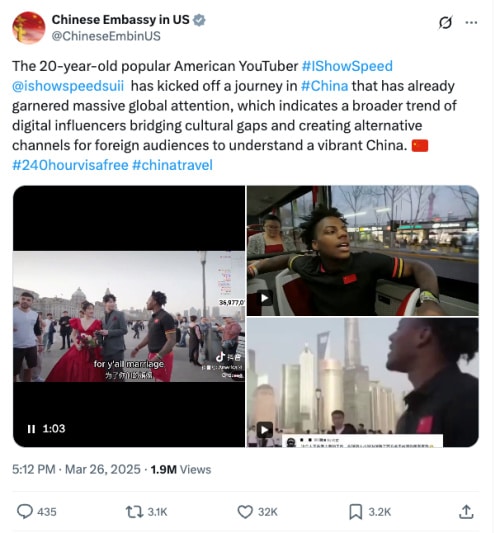
Post by Chinese Embassy in the US on X, March 26.
“This 20-year-old American internet star is bridging cultural gaps through digital means and creating new channels for foreign audiences to better understand China.”
So what exactly did IShowSpeed do while in China?
On March 24, Watkins livestreamed from Shanghai. He wandered around the city center, visited a KFC, danced with fellow streamers, stopped by a marriage market, ate noodles, played ping-pong, had hotpot, joined a dragon dance group and got acquainted with some traditional Chinese opera performance, and walked along the Bund.

On March 26, he streamed from Beijing, starting in Donghuamen before briefly entering the Forbidden City—dressed in a Dongbei-style floral suit. He later took a stroll around Nanluoguxiang and the scenic Houhai lake, rode a train, and finally visited the Great Wall, where he did backflips.

In his stream on March 28, Watkins traveled to Henan to visit the famous Shaolin Temple in Dengfeng, hoping to find a master to teach him kung fu. He trained with Shaolin monks—footage that quickly went viral.
Lastly, on March 29, he opened his own Weibo account and published his first post. On Douyin, he shared a video of his visit to Fuxi Mountain in Zhengzhou, featuring the popular “Stairway to Heaven” tourist spot.
On social media, many viewers were captivated by the content. One major talking point was the remarkably strong internet connection that allowed him to livestream for six-hour stretches without losing signal in Shanghai. (Though his Beijing stream started off patchier, the drop was minor.) For many, it symbolized the quality of China’s 5G services.
Foreign viewers also praised how safe, friendly, and clean the country appeared, and how his streams highlighted various aspects of Chinese culture—from everyday people to traditional arts and local cuisine.
🔹 Telling & Spreading China’s Stories Well
It is no wonder the success of the Jiǎkànggē livestreams is celebrated by Chinese official media in an age where China’s foreign communication aims to increase China’s international discourse power, shaping how the world views China and making that image more credible, more respectable, and more lovable.
That’s not just an observation — it’s an official strategy. Introduced by Xi Jinping in 2013, “Telling China’s Story Well” (“讲好中国故事”) is a political slogan that has become a key propaganda strategy for China and continues to be a priority in finding different ways of promoting Chinese culture — new ways of telling China’s story in the social media age – while countering Western dominant narratives about China.
In increasingly digitalized times, it is not just about telling China’s story well, but also spreading China’s message effectively — preferably through genuine and engaging stories (Cai 2013; Qiushi 2021).
Especially young, non-official ‘storytellers’ can make China’s image more relatable and dynamic. One major example, highlighted in a 2022 case study by Zeng Dan (曾丹), is Chinese influencer Li Ziqi (李子柒). You’ve probably heard of her, or seen snippets of her videos: she creates soothing, cinematic content depicting China’s countryside lifestyle, focused on cooking, crafts, and gardening. With 26 million followers on YouTube, Li Ziqi became a viral sensation who successfully communicated an authentic and appealing ‘China story’ to a broad global audience.

Li Ziqi in one of her YouTube videos.
Although the calm and composed Li Ziqi and the loud, chaotic IShowSpeed couldn’t be more different, they have some things in common: both have large international fanbases, including their millions of YouTube subscribers; they offer perspectives that differ from Chinese state media or official channels; and they have the capacity not just to tell China’s story well, but to spread it effectively through videos and livestreams.
🔹 Spontaneous Stream or Scripted Propaganda?
IShowSpeed’s China streams have triggered a wave of responses from fans and viewers, sparking discussions across international social media and even making newspaper headlines.
In English-language online media spheres, there appear to be a range of perspectives on Watkins’ China trip:
📌 One prominent view—also echoed by various foreign influencers on YouTube and other platforms—is that IShowSpeed’s visit counters “Western media lies” about China and has successfully shown the “real China” through his livestreams. The Shanghai-based media outlet Radii claimed that “IShowSpeed’s China Tour is doing more for Chinese Soft Power than most diplomats ever could.”
📌 Others challenge this narrative, questioning which dominant Western portrayals of China IShowSpeed has actually disproven. Some argue that the idea of China being a “bleak place with nothing to do where people live in misery” is itself a false narrative, and that presenting IShowSpeed’s livestreams as a counter to that is its own form of propaganda (see: Chopsticks and Trains).
📌 There are also those who see Watkins’ trip as a form of scripted propaganda. To what extent were his livestreams planned or orchestrated? That question has become one of the central points of debate surrounding the hype around his visit.
These rumors have been addressed by cameraman Slipz (@shotbyslipz), who took to X on March 28, 2025. Slipz posted that the team is “(..) not making political content, not any documentary and no journalism,” and later added: “Fact: amount of money IShowSpeed has received from Chinese Government = $0.”

But does the fact that IShowSpeed did not receive money from the Chinese government mean that it wasn’t also a form of China promotion?
➡️ Organized — it definitely was. Any media trip in China has to be. IShowSpeed would have needed a visa, he had translators with him, and throughout the streams it’s evident that local guards and public security officers were present, walking alongside and helping to keep things under control, especially in crowded areas and at major tourist spots — from Nanjing Road in Shanghai to an entire group of guards seemingly accompanying the entourage in the Forbidden City.
One logistical “advantage” to his visit was the fact that YouTube is blocked in China. While some Chinese fans do bypass the Great Firewall to access the platform, IShowSpeed remains far less known in China than in many other countries — a factor that likely contributed to how smoothly the streams went and helped prevent chaos. The team also launched a Douyin account during the trip, where he now has over two million followers. (To stream directly to their 37 million followers on YouTube, Watkins’ team either needed a VPN to access WiFi or had arranged roaming SIM cards to stay connected.)
➡️ Was it staged? Many parts clearly weren’t: casual public conversations, spontaneous barber visits in both Shanghai and Beijing (with barbers looking unsure of how to handle the situation), and wholesome fan encounters. There was even a moment when Watkins walked into a public restroom and forgot to mute the sound.
But other parts of the trip were undeniably staged — or at least framed to appear spontaneous. When visiting a marriage market in Shanghai, for instance, two actors appeared, including one woman with a sign stating she was looking for someone “capable of doing backflips.”
When Watkins took a “random” ride in what was described as the fastest car in China — the Xiaomi SU7 Ultra — the vehicle appeared to be conveniently parked and ready.
Similarly, when the streamer “ran into” Chinese-American TikTok influencer Miles Moretti (李美越) in Beijing, it turned out to be the person who would give him the now-iconic bright Dongbei flower suit and accompany him on his journey.

The ping-pong, the kung fu, the Peking opera, the hotpot, the Forbidden City tour — it all plays into the kinds of experiences that official channels also like to highlight. While likely planned by Watkins’ team in coordination with local partners, it was all far more orderly and tourism-focused than, for example, Watkins’ chaotic visit to the Netherlands.
Watkins and his entourage were also well-informed about the local dos and don’ts. At one point, Watkins even mentions “following the rules,” and when Moretti tells him mid-stream that “somebody very important lives on our left,” Watkins asks “Who?” — but the camera zooms out and the question goes unanswered, suggesting they may have been reminded that certain names or topics were off-limits (judge the moment for yourself here).
The livestream didn’t always go exactly the way Watkins wanted, either. When he attempted to take more random walks around the city, the crew appeared to be informed that some areas were off-limits, and he was asked to return to the car to continue the trip (clips here and here).
🔹 The “Nàge” Song
One major talking point surrounding IShowSpeed’s China livestreams was “the N-word.” No, not that N-word — but the Chinese filler word “nàge” or “nèige” (那个). Like “uhm” in English or “eto” in Japanese, “nàge” is a hesitation marker commonly used in everyday Mandarin conversation. It also functions as a demonstrative pronoun meaning “that.”
The word has previously stirred controversy because of its phonetic resemblance to a racial slur in English. In 2020, an American professor at the University of Southern California’s Marshall School of Business was even temporarily suspended after using the word during an online communications class — some students misunderstood its context and took offense.
The word — and the song “Sunshine, Rainbow, White Pony” (阳光彩虹小白马) by Chinese singer Wowkie Zhang (大张伟), which repeatedly features the word nàge in its chorus — popped up multiple times during Watkins’ trip. The catchy tune essentially became the theme song of his visit.
The first nàge moment actually already appeared within the first five minutes of Watkins’ Shanghai stream, when a Chinese comedian approached him on the street, trying to recall a joke. “What?!” Watkins reacted, with laughter in the background. “That’s not a joke, you said n**! It’s my first five minutes in China!” he exclaimed, before patting the man’s back in a friendly gesture, clearly not offended.
🔄 It resurfaced again within the first hour when Watkins visited a marriage market and one of the performers sang the Wowkie Zhang song. Watkins initially acted shocked, then demanded they sing it again — only to burst out laughing and start singing along.
🔄 Later, he sang the song again with a street saxophonist and encouraged others to join in.
🔄 At other moments, he played up the drama again, feigning anger when a crowd broke into the chorus, and it became a recurring gag throughout the streams.
These incidents all seem staged. One of the main reasons Watkins is known to many netizens in China is because of an older video clip showing his exaggerated reaction to the nàge song — dating back to at least 2022. So while it may have looked spontaneous, Watkins was already familiar with the word and the viral song long before his China trip.The attention given to the nàge ‘controversy’ was likely amplified for views and engagement.
While Watkins was clearly in on this part of the show — as with others — he also seemed genuinely, and at times amusingly, unaware of many things in China. He repeatedly referred to RMB as “dollars,” mistook elderly women for retired YouTube streamers, and even assumed that a woman livestreaming near the Forbidden City was reading his chat and trying to collaborate with him — although she seemed totally uninterested and was just minding her own business.
🔹 A Win-Win Situation
In the end, IShowSpeed’s visit highlighted two sides effectively doing their job. Watkins and his team successfully arranged a YouTube trip that generated high ad revenue, attracted millions of new subscribers, and boosted his brand and global fame.
On the Chinese side, there was clearly coordination behind the scenes to ensure the trip went smoothly: avoiding controversy, ensuring safety, and showcasing positive aspects of Chinese culture. From traditional opera and kung fu to ping pong, IShowSpeed’s content gave center stage to the kinds of cultural highlights that align closely with China’s official narratives and tourism goals. Even if the government didn’t pay the YouTuber directly, as his team has emphasized (and there’s no reason to doubt them), the trip still fit seamlessly into China’s soft power strategy.
IShowSpeed’s China visit has created a unique media moment that resonates for several reasons: it’s the encounter of a young modern American with old traditional China; it is a streamer known for chaos visiting a nation known for control. And it brings different benefits to both sides: clicks and ad revenue for IShowSpeed, and free foreign-facing publicity for China.
No, IShowSpeed didn’t undo years of critical Western media coverage on China. But what his visit shows is that we’ve entered a phase where China is becoming more skilled at letting others help tell its story — in ways that resonate with a global, young, online audience. He didn’t do “God’s work.” He simply did what he always does: stream. And with China’s help, he streamed China very well.
There’s so much more I want to share with you this week — from Chinese reactions to the devastating Myanmar earthquake, to a recent podcast I joined with Dutch newspaper De Telegraaf (link in Dutch, for those interested). But it also happens to be my birthday today, and I’m really hoping to still grab some birthday hotpot — so I’ll wrap this up here. I’ll keep you informed on the other trends in the next newsletter.📨.
Best,
Manya
(@manyapan)
References:
Cai, Mingzhao 蔡名照. 2013. “Telling China’s Stories Well and Spreading China’s Voice: Thoroughly Studying and Implementing the Spirit of Comrade Xi Jinping’s Important Speech at the National Conference on Propaganda and Ideological Work [讲好中国故事,传播好中国声音——深入学习贯彻习近平同志在全国宣传思想工作会议上的重要讲话精神].” People’s Daily 人民日报, October 10. http://politics.people.com.cn/n/2013/1010/c1001-23144775.html. Accessed March 29.
Qiushi 求是网. 2021. “Xi Jinping: Telling China’s Story Well, Spread China’s Voice Well [习近平:讲好中国故事,传播好中国声音].” Qs Theory, June 6. http://www.qstheory.cn/zhuanqu/2021-06/02/c_1127522386.htm. Accessed March 29.
Zeng Dan 曾丹. 2022. “How to Tell China’s Story Well: Taking Li Ziqi as an Example [如何讲好中国故事——以李子柒为例].” Progress in Social Sciences 社会科学进展 4 (1): 10–19. https://doi.org/10.35534/pss.0401002.
What’s Featured

Quite terrifying and interesting, as this trending story touched upon so many different issues.
What started as a single snarky comment on Weibo spiraled into an online witch hunt, exposing not just some dark sides of online Kpop fandom but also, most importantly, the vulnerabilities in China’s digital privacy.
Read the story, the latest by Ruixin Zhang 👀
This is an on-site version of the Weibo Watch newsletter by What’s on Weibo. Missed last week’s newsletter? Find it here. If you are already subscribed to What’s on Weibo but are not yet receiving this newsletter in your inbox, please contact us directly to let us know.
Newsletter
Weibo Watch: The Great Squat vs Sitting Toilet Debate in China🧻
This week, the Catch-22 of sitting versus squat toilets sparked heated discussion on Weibo after a Beijing News article exposed the messy reality of sitting toilets in Beijing malls.
Published
4 months agoon
March 23, 2025
PREMIUM NEWSLETTER | ISSUE #50
Dear Reader,
Shoe prints on top of the toilet seat are never a pretty sight. To prevent people from squatting over Western-style sitting toilets, there are some places that will place stickers above the toilet, reminding people that standing on the seat is strictly forbidden.

For years, this problem has sparked debate. Initially, these discussions would mostly take place outside of China, in places with a large number of Chinese tourists. In Switzerland, for example, the famous Rigi Railways caused controversy for introducing separate trains with special signs explaining to tourists, especially from China, how (not) to use the toilet.
Squat toilets are common across public areas in China, especially in rural regions, for a mix of historical, cultural, and practical reasons. There is also a long-held belief — backed by studies (like here or here) — that the squatting position is healthier for bowel movements (for more about the history of squat toilets in China, see Sixth Tone’s insightful article here).
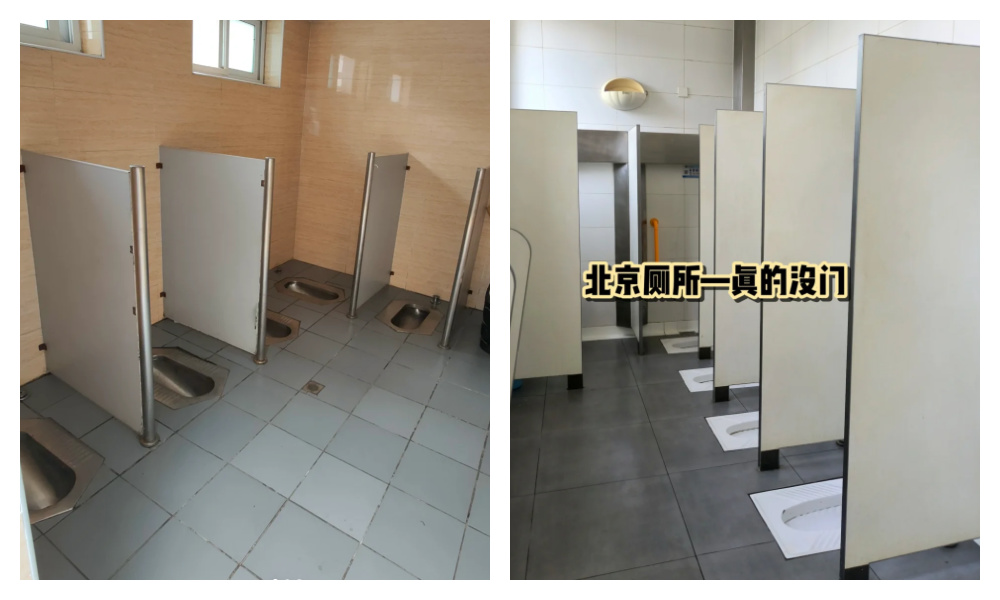
Public squatting toilets in Beijing, images via Xiaohongshu.
Without access to the ground-level squat toilets they are used to — and feel more comfortable with — some people will climb on top of sitting toilets to use them in the way they’re accustomed to, seeing squatting as the more natural and hygienic method.

Not only does this make the toilet seat all messy and muddy, it is also quite a dangerous stunt to pull, can break the toilet, and lead to pee and poo going into all kinds of unintended directions. Quite shitty.

Squatting on toilets makes the seat dirty and can even break the toilet.
Along with the rapid modernization of Chinese public facilities and the country’s “Toilet Revolution” over the past decade, sitting toilets have become more common in urban areas, and thus the sitting-toilet-used-as-squat-toilet problem is increasingly becoming topic of public debate within China.
The Toilet Committee and Preference for Sitting Toilets
Is China slowly shifting to sitting toilets? Especially in modern malls in cities like Beijing, or even at airports, you see an increasing number of Western-style sitting toilets (坐厕) rather than squatting toilets (蹲厕).
This shift is due to several factors:
🚽📌 First, one major reason for the rise in sitting toilets in Chinese public places is to accommodate (foreign) tourists.
In 2015, China Daily reported that one of the most common complaints among international visitors was the poor condition of public toilets — a serious issue considering tourists are estimated to use public restrooms over 27 billion times per year.
That same year, China’s so-called “Toilet Revolution” (厕所革命) began gaining momentum. While not a centralized campaign, it marked a nationwide push to upgrade toilets across the country and improve sanitation systems to make them cleaner, safer, and more modern.
This movement was largely led by the tourism sector, with the needs of both domestic and international travelers in mind. These efforts, and the buzzword “Toilet Revolution,” especially gained attention when Xi Jinping publicly endorsed the campaign and connected it to promoting civilized tourism.
In that sense, China’s toilet revolution is also a “tourism toilet revolution” (旅游厕所革命), part of improving not just hygiene, but the national image presented to the world (Cheng et al. 2018; Li 2015).
🚽📌 Second, the growing number of sitting toilets in malls and other (semi)public spaces in Beijing relates to the idea that Western-style toilets are more sanitary.
Although various studies comparing the benefits of squatting and sitting toilets show mixed outcomes, sitting toilets — especially in shared restrooms — are generally considered more hygienic as they release fewer airborne germs after flushing and reduce the risk of infection (Ali 2022).
There are additional reasons why sitting toilets are favored in new toilet designs. According to Liang Ji (梁骥), vice-secretary of the Toilet Committee of the China Urban Environmental Sanitation Association (中国城市环境卫生协会厕所专业委员会), sitting toilets are also increasingly being introduced in public spaces due to practical concerns.
🚽📌 Squatting is not always easy, and can pose a safety risk, particularly for the elderly, pregnant women, and people with disabilities.
🚽📌 Then there are economic reasons: building squat toilets in malls (or elsewhere) requires a deeper floor design due to the sunken space needed below the fixture, which increases both construction time and cost.
🚽📌 Liang also points to an aesthetic factor: sitting toilets simply look more “high-end” and are easier to clean, which is why many consumer-oriented spaces prefer to install Western-style toilets.
So although there are plenty of reasons why sitting toilets are becoming a norm in newly built public spaces and trendy malls, they also lead to footprints on toilet seats — and all the problems that come with it.
The Catch 22 of Sitting vs Squad Toilets
This week, the issue became a trending topic on Weibo after Beijing News published an investigative report on it. The report suggested that most shopping malls in Beijing now have restrooms with sitting toilets, which should, in theory, be cleaner than the squat toilets of the past — but in reality, they’re often dirtier because people stand on them. This issue is more common in women’s restrooms, as men’s restrooms typically include urinals.
In researching the issue, a reporter visited several Beijing malls. In one women’s restroom, the reporter observed 23 people entering within five minutes. Although the restroom had only three squat toilets versus seven sitting ones, around 70% of the users opted for the squat toilets.
Upon inspection, most of the seven sitting toilets were dirty — despite being equipped with disposable seat covers — showing clear signs of urine stains and footprints. They found that sitting toilets being used as squat toilets is extremely common.
It’s a bit of a Catch-22. People generally prefer clean toilets, and there’s also a widespread preference for squat toilets. This leads to sitting toilets being used as squat toilets, which makes them dirty — reinforcing the preference for squat toilets, since the sitting toilets, though meant to be cleaner, end up dirtier.
In interviews with 20 women, nearly 80% said they either hover in a squat or directly squat on the toilet seat. One woman said, “I won’t sit unless I absolutely have to.” While some of those quoted in the article said that sitting toilets are more comfortable, especially for elderly people, they are still not preferred when the seats are not clean.
In the Beijing News article, the Toilet Committee’s Liang Ji suggested that while a balanced ratio of squat and sitting toilets is necessary, a gradual shift toward sitting toilets is likely the future for public restrooms in China.

How NOT to use the sitting toilet. Sign photographed by Xiaohongshu user @FREAK.00.com.
Liang also highlighted the importance of correct toilet use and the need to consider public habits in toilet design.
In Squatting We Trust
On Chinese social media, however, the majority of commenters support squatting toilets. One popular comment said:
💬 “Please make all public toilets squat toilets, with just one sitting toilet reserved for people with disabilities.”

Squatting toilets in a public toilet in a Beijing hutong area, image by Xiaohongshu user @00后饭桶.
The preference for squatting, however, doesn’t always come down to bowel movements or tradition. Many cite a lack of trust in how others use public toilets:
💬 “When it comes to things for public use, it’s best to reduce touching them directly. Honestly, I don’t trust other people…”
💬 “Squatting is the most hygienic. At least I don’t have to worry about touching something others touched with their skin.”
💬 “I hate it when all the toilets in the women’s restroom at the mall are sitting toilets. I’m almost mastering the art of doing the martial-arts squat (蹲马步).”
Others view the gradual shift toward sitting toilets as a result of Westernization:
💬 “Sitting toilets are a product of widespread ‘Westernization’ back in the day — the further south you go, the worse it gets.”
But some come to the defense of sitting toilets:
💬 “Are there really still people who think squat toilets are cleaner? The chances of stepping in poop with squat toilets are way higher than with sitting ones. Sitting toilet seats can be wiped with disinfectant or covered with paper. Some people only care about keeping themselves ‘clean’ without thinking about whether the next person might end up stepping in their mess.”
💬 One reply bluntly said: “I don’t use sitting toilets. If that’s all there is, I’ll just squat on top of it. Not even gonna bother wiping it.”
It’s clear this debate is far from over, and the issue of people standing on toilet seats isn’t going away anytime soon. As China’s toilet revolution continues, various Toilet Committees across the country may need to rethink their strategies — especially if they continue leaning toward installing more sitting toilets in public spaces.
As always, Taobao has a solution. For just 50 RMB (~$6.70), you can order an anti-slip sitting-to-squatting toilet aid through the popular e-commerce platform.

The Taobao solution.
For Chinese malls, offering these might be cheaper than dealing with broken toilets and the never-ending battle against footprints on toilet seats…
Best,
Manya
(@manyapan)
References:
Ali, Wajid, Dong-zi An, Ya-fei Yang, Bei-bei Cui, Jia-xin Ma, Hao Zhu, Ming Li, Xiao-Jun Ai, and Cheng Yan. 2022. “Comparing Bioaerosol Emission after Flushing in Squat and Bidet Toilets: Quantitative Microbial Risk Assessment for Defecation and Hand Washing Postures.” Building and Environment 221: 109284. https://doi.org/10.1016/j.buildenv.2022.109284.
Bhattacharya, Sudip, Vijay Kumar Chattu, and Amarjeet Singh. 2019. “Health Promotion and Prevention of Bowel Disorders Through Toilet Designs: A Myth or Reality?” Journal of Education and Health Promotion 8 (40). https://doi.org/10.4103/jehp.jehp_198_18.
Cao, Jingrui 曹晶瑞, and Tian Jiexiong 田杰雄. 2025. “城市微调查|商场女卫生间,坐厕为何频频变“蹲坑”? [In Shopping Mall Women’s Restrooms, Why Do Sitting Toilets Frequently Turn into ‘Squat Toilets’?]” Beijing News, March 20. https://weibo.com/ttarticle/p/show?id=2309405146044773302810. Accessed March 19, 2025.
Cheng, Shikun, Zifu Li, Sayed Mohammad Nazim Uddin, Heinz-Peter Mang, Xiaoqin Zhou, Jian Zhang, Lei Zheng, and Lingling Zhang. 2018. “Toilet Revolution in China.” Journal of Environmental Management 216: 347–356. https://doi.org/10.1016/j.jenvman.2017.09.043.
Dai, Wangyun. 2018. “Seats, Squats, and Leaves: A Brief History of Chinese Toilets.” Sixth Tone, January 13. https://www.sixthtone.com/news/1001550. Accessed March 22, 2025.
Li, Jinzao. 2015. “Toilet Revolution for Tourism Evolution.” China Daily, April 7. https://europe.chinadaily.com.cn/opinion/2015-04/07/content_20012249_2.htm. Accessed March 22, 2025.
China’s Online Discourse on the Russia-Ukraine War

In case you missed it in our earlier newsletter, we recently published the article “US-Russia Rapprochement and ‘Saint Zelensky’: Chinese Online Reactions to Trump’s Shake-Up” as part of our What’s on Weibo Chapters. For more insights into how the war is discussed on Chinese social media, you can catch up here.
Stay tuned — we’re publishing another article on this topic later this week, exploring the unexpected connection between the Russia-Ukraine war and Chinese cosplayers.
What’s Trending
🍏 Chinese Netizens Turn to Tim Cook Over Factory’s Illegal Overtime
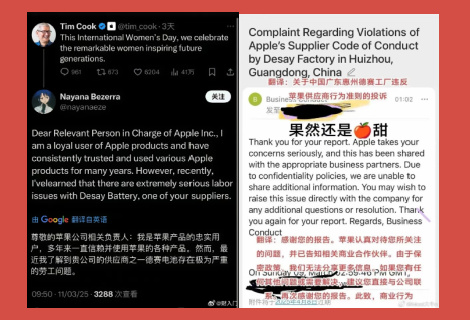
Netizens have recently started reaching out to Apple and its CEO Tim Cook in order to put pressure on a Chinese battery factory accused of violating labor laws. The controversy involves the Huizhou factory of Desay Battery (德赛电池), known for producing lithium batteries for the high-end smartphone market, including Apple and Samsung. The factory caught netizens’ attention after a worker exposed in a video that his superiors were deducting three days of wages because he worked an 8-hour shift instead of the company’s “mandatory 10-hour on-duty.” Compulsory overtime violates China’s labor laws.
In response, the worker and other netizens started to let Apple know about the situation through email and social media, trying to put pressure on the factory by highlighting its position in the Apple supply chain. By now, Desay Battery issued an official statement, admitting to “management oversights regarding employee rights protection” (“保障员工权益的管理上存在疏漏”) and promising to do better in safeguarding employee rights.
It’s an interesting story, and some commentators suggest that it shows that Chinese workers can effectively expose labor violations by reporting them to Western suppliers or EU regulators. But opinions vary. Others are less optimistic about the effectiveness, arguing that companies like Apple would be quick to drop suppliers over product quality issues but more willing to turn a blind eye to labor violations—since cheap labor remains a key competitive advantage in Chinese manufacturing.
💸 From Patriotic Influencer to Tax Evader: Sima Nan Fined More Than Nine Million Yuan

China’s well-known nationalist blogger Sima Nan (司马南) became a trending topic on Friday after being hit with a 9 million RMB ($1.2 million) fine for tax evasion. According to state media, from 2019 to 2023, he underpaid millions of yuan in personal income tax and other taxes by concealing income and submitting false declarations.
Sima responded to media, saying he fully admits guilt. At the same time he’s also blaming the multi-channel network that allegedly was in charge of paying taxes on his behalf at the time.
📌 Noteworthy: Sima Nan promised that- if he’ll still be allowed to have his social media presence – he would in detail explain how he ended up becoming a tax evader. This is kind of funny, because it shows just how good he is in what he does, turning his PR crisis into an opportunity for clicks and views 📈 (yes we do want to know how he went from patriotic influencer to becoming a multi-million tax dodger).
📌Public reaction: The most recurring comments I’ve seen on Weibo is that people are amazed at his high income. They note the hypocrisy of a nationalist, patriotic influencer who’s always preaching truth & justice evading taxes himself, and also conclude that being a nationalist is truly a money-making business🤑🇨🇳
💔 Tragedy at Hubei University: Zhang Yuzhen’s Disappearance and Aftermath

The disappearance of 19-year-old Chinese student Zhang Yuzhen (张钰臻) has captured nationwide attention this week. Zhang did not return after leaving her campus at Hubei University around 5 p.m. on March 15. Her phone remained traceable until 5:54 p.m., about one kilometer from campus. The case became a hot topic as millions of netizens turned into online sleuths, searching for clues that might lead to Zhang’s whereabouts.
On the afternoon of March 20, it was reported that Zhang’s personal items — including her keys and glasses — were discovered by a passerby next to a lake near the university. Police then began searching the lake. By that evening, her remains were found. The case is still under investigation.
There has been some online criticism regarding how the university handled Zhang’s disappearance. Although she was last seen on March 15, it wasn’t until March 18 that her parents were notified by a school counselor. They then reported her missing to the police, after which the school began cooperating with the investigation.
Now, there is also much discussion surrounding the behavior of Zhang’s mother, who has been publicly expressing her grief and anger on Douyin. After learning of her daughter’s death, she became emotionally distraught — screaming, crying, and demanding answers. She seemingly caused some public disturbance when she was prevented from immediately seeing her daughter’s remains, and was also not allowed to leave her hotel (perhaps due to concerns over her emotional state, though details remain unclear at this time). While some online voices have criticized her behavior, many are calling for empathy, arguing that any mother who has just lost her child would be desperate and distraught.
What’s Noteworthy

“The world is so big, I want to go out and see it” (Shìjiè nàme dà, wǒ xiǎng qù kànkan “世界那么大,我想去看看”).
This ten-character sentence became part of China’s collective social media memory after a teacher’s resignation note went viral in 2015. Now, a decade later, the phrase has gone viral once again.
In April 2015, the phrase caused a huge buzz on China’s social media when the female teacher Gu Shaoqiang (顾少强) at Zhengzhou’s Henan Experimental High School resigned from her job. Working as a psychology teacher for 11 years, she gave a class in which she made students write a letter to their future self. The exercise made her realize that she, too, wanted more from life. Despite having little savings, she submitted a simple resignation note that read: “The world is so big, I want to go out and see it.”
The resignation letter was approved, and she posted it to social media.
The letter resonated with millions of Chinese who felt they also wanted to do something different with their life, like go and travel, see the world, and escape the pressures and routines of their daily life. The phrase became so popular that it was adapted in all kinds of ways and manners, by meme creators, in books, by brands, and even by Xi Jinping, who said: “China’s market is so big, we welcome everyone to come and see it” (“中国市场这么大,欢迎大家都来看看”).
This week, Lěngshān Record (冷杉Record), the Wechat account under Chinese media outlet Phoenix Weekly (凤凰周刊), revisited the phrase and published a short documentary about Gu’s life after the resignation and the hype surrounding it.
An earlier news article about Gu’s life post-resignation already disclosed that Gu, despite receiving many sponsorship deals, never actually extensively traveled the world. In the short documentary, Gu explains that she chose to “return home after seeing the world.” By this, she doesn’t mean traveling extensively abroad, but rather gaining life experience in a broader sense. While she did travel, it was within China, including in Tibet and Qinghai.
What truly changed was her life path. She left Zhengzhou and relocated to Chengdu to be near Yu Fu (于夫), a man she had met just weeks earlier by chance during a trip to Yunnan. Six months after the resignation letter, she married him. Together, they ended up opening a hostel near Chengdu, married, and had a daughter.
Gu, now 45 years old, has been back in her hometown of Zhengzhou for the past years, caring for her aging mother and 9-year-old daughter. She is living separately from her husband, who manages their business in Chengdu. She also runs her own livestreaming and online parenting consultancy business.
Although the woman who wanted to “see the world” ended up back home, she has zero regrets about what she did, suggesting her courage to step out of the life she found limiting ultimately transformed her in a meaningful way.
On Chinese social media, the topic went trending on March 19. Most people cannot believe it’s already been ten years since the sentence went trending (“What? How could time fly like that?”). Others, however, wonder about the hopes and dreams behind the original message—and how it all turned out.
💬 “Seeing the world? She just escaped her old life, got married, and had a baby. How is that ‘seeing the world’?” one commenter wondered (@-NANA酱- ).
💬 “The world is so big—what did she end up seeing?” others questioned. “She went from Zhengzhou to Chengdu.”
💬 “Seeing the world takes money,” some pointed out.
💬 But others came to her defense, saying that “seeing the world” also means stepping out of your comfort zone and exploring a different life. In the end, Gu certainly did just that.
💬 “She was quite courageous,” another commenter wrote: “She gave up a stable job to go and see the world. Perhaps her life didn’t end up so rich, but the experiences she gained are priceless.”
The world is still big, though, and there’s plenty left for Gu Shaoqiang to see.
Also read what we wrote about this in 2015: In The Digital Age, ‘Handwritten Weibo’ Have Become All The Rage
What’s Memorable

📚 This pick from our archive is from last year, about Fan Zeng (范曾), the famous Chinese calligrapher, who is turning 87 soon and has a wife 50 years his junior.
This week, some videos featuring Chinese theoretical physicist & Nobel Prize winner Yang Chen-Ning (杨振宁) circulated on social media. Yang is turning 103 this year. Still sharp of mind, and he takes a walk every day.

Yang Chen-ning
In this interview here, when asked about the secret to his longevity, he points to one thing above all: luck.
🍀 Mostly, he suggests it’s the luck of good genes. On his father’s side, diabetes was common, but he was fortunate to inherit his mother’s genes in that regard.
🍚 He also mentions the luck of never experiencing extreme hunger during wartime — he lived in Kunming during those years.
💪 And then he stresses the importance of taking walks, every day, since he was about 70. Keep moving, keep the blood flowing!
What he doesn’t mention, however, is that his wife, Weng Fang (翁帆), is 54 years (!) his junior — I’m pretty sure she helps keep him young too…
Fan and Yang are good friends, and Yang’s good health might have inspired him to marry his 50-years-younger girlfriend last year. Read more 👇
This is an on-site version of the Weibo Watch newsletter by What’s on Weibo. Missed last week’s newsletter? Find it here. If you are already subscribed to What’s on Weibo but are not yet receiving this newsletter in your inbox, please contact us directly to let us know.
Popular Reads
-

 China Society10 months ago
China Society10 months agoDeath of Chinese Female Motorcycle Influencer ‘Shigao ProMax’ Sparks Debate on Risky Rides for Online Attention
-

 China World11 months ago
China World11 months agoChina at Paris 2024 Olympics Trend File: Medals and Moments on Chinese Social Media
-

 China Memes & Viral11 months ago
China Memes & Viral11 months agoTeam China’s 10 Most Meme-Worthy Moments at the 2024 Paris Olympics
-

 China Memes & Viral12 months ago
China Memes & Viral12 months agoAbout Wang Chuqin’s Broken Paddle at Paris 2024






